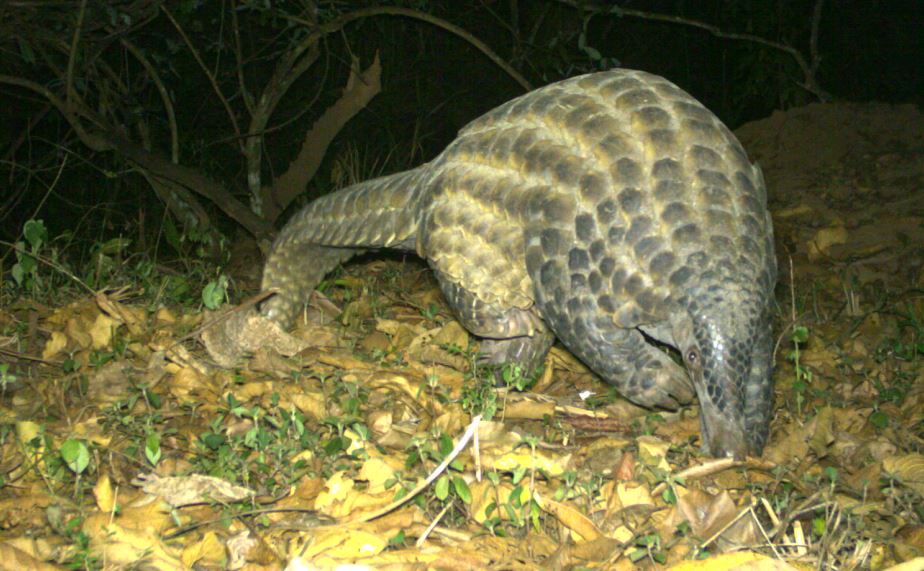
Family
Chester Zoo cameras capture the Secret Life of the rare Giant Pangolin
7 years ago

Pangolins are the world’s most trafficked mammal and are illegally hunted for their scales and meat.
Conservationists from Chester Zoo have captured ‘momentous’ video footage of the elusive giant pangolin – part of a pioneering study which is revealing new insights into the previously secret lives of the little-known species.
The zoo team, in collaboration with the Uganda Wildlife Authority (UWA) and the Rhino Fund Uganda (RFU), is aiming to uncover new information about the rare nocturnal animals in the first ever study of species in Uganda. Scientists hope to generate vital data that will help with the long-term conservation of giant pangolins in Uganda, and elsewhere in Africa.
Pangolins, sometimes called scaly anteaters, are the only mammals in the world to be covered in hard overlapping and protective scales made of keratin – the same substance as human finger nails and rhino horn. They live on a diet consisting entirely of ants and termites, which they lap up with their long sticky tongues, and are able to quickly roll themselves up into a tight ball when threatened.
The giant pangolin, measuring up to 5.9ft (1.8m) long and weighing up to 5st (75lbs), is by far the largest of the world’s eight pangolin sub-species and is found only in the rainforests and grasslands of equatorial Africa.
Pangolins are protected by international wildlife laws that ban their trade, but they remain the most illegally trafficked group of mammals in the world. Their meat is considered a delicacy in many countries and their scales are widely used in traditional medicines, particularly in Vietnam and China, despite there being no medical benefit from their use.

In Uganda, hunting or possession of protected wildlife species such as pangolins carries a punishment of five years imprisonment, while trafficking of pangolins or any other wildlife species carries a minimum prison sentence of seven years.
However, despite full legal protection in Uganda and elsewhere in Africa, international customs agents have in recent years intercepted large shipments of African pangolin scales. Earlier this month, customs officials in Hong Kong seized the world’s largest ever haul of pangolin scales, weighing a staggering 8.5 tonnes and representing thousands of African pangolins.
Meanwhile, officials in Uganda recently seized 423.7 kilograms of pangolin scales believed to have originated in the Democratic Republic of Congo.
Such seizures have set alarm bells ringing for conservationists, but very little is known about giant pangolin behaviour, ecology and habitat requirements – crucial information which is urgently required in order to develop strategies to monitor populations and protect them.
Now, researchers from Chester Zoo have surveyed for the presence of giant pangolins within three protected areas in Uganda. Working alongside the RFU, they have carried out an intensive survey of the country’s Ziwa Sanctuary using camera traps and tracking techniques such as looking for footprints, burrows and other signs of the species.
So far, the 70 motion-sensor trail cameras installed by the zoo in Ziwa have captured hundreds of images and video clips of giant pangolins, including the first colour footage of the species ever recorded in Uganda. From these images and films, the researchers are now able to identify a number of individual pangolins by the unique marks and patterns on their scales and are recording previously unknown behaviours.
Stuart Nixon, Chester Zoo’s Africa Field Programme and Research Lead, said:“ The giant pangolin is a beautiful, mysterious and utterly fascinating species but studying them is extremely challenging . Being nocturnal, rare and very shy it’s only with new technologies such as high sensitivity trail cameras that we are able to learn more about how they live and interact with their each other and their environment.
“Tragically we do know the giant pangolin faces a huge risk of going extinct across Central Africa. With no giant pangolins in zoos or safari parks anywhere in the world, all our conservation efforts must focus on saving them in the wild. The race is on against criminal networks that only value dead pangolins, to save this species and protect them well into the future.
“The momentous images and video we are capturing at Ziwa prove that when sites are well protected against poaching giant pangolins and other species can flourish.”
By collecting pangolin dung samples, the zoo’s conservationists are also gathering crucial information on the animals’ diet and hope to learn more about the genetics of giant pangolins. The team is also planning to fit satellite and radio tracking devices on the scales of giant pangolins to learn more about their ranging behaviour, feeding ecology and to help develop methods that allow conservationists to count and monitor them.










 Subscribe
Subscribe Follow Us
Follow Us Follow Us
Follow Us Follow Us
Follow Us Follow Us
Follow Us Follow Us
Follow Us











